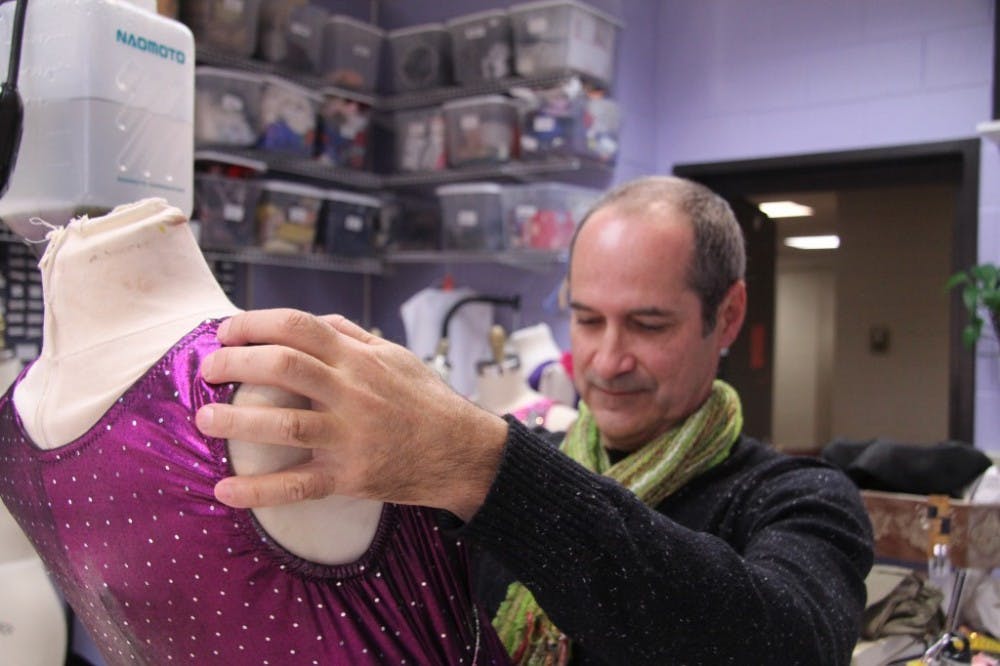This Winter Term, Elon University’s Performing Arts Department has taken on a new challenge: remaking a classic.
Sophocles wrote “Antigone” around 440 BC, and the tragedy has been the definition of a true classic for the nearly 2,500 years that have passed since. A show with such a lengthy history may have already undergone countless interpretations, but Elon’s Fred Rubeck and Karl Green are doing their best to present “Antigone” in an entirely new light.
Rubeck and Green, chair of the Department of Performing Arts and assistant professor of performing arts, respectively, have given the true classic a contemporary update.
Rubeck’s goal was to adapt the script so it appealed to a more modern audience.
“I was really trying to preserve the impact of the historic work but make it more palatable to modern audiences,” Rubeck said. “The story and issues are the same, but the manner in which we tell it, from the script through the design, is new.”
“Antigone” takes place in the city of Thebes in ancient Greece. The title character is the daughter of Oedipus and his mother, Jocasta. Unfortunate circumstances force Antigone — played by senior Gabrielle Toledo — to choose between what she thinks is right and what authority says is right.
Rubeck said this conflict will appeal to a college audience.
“This is really a young person’s play,” he said. “It pits authority against conviction, duty to self and family versus rules and laws.”
While Rubeck updated the script, Green focused on giving the show a new vision.
Charged with producing costumes for a show with a limited budget and a relatively short production time, Green was hard-pressed to create a style that presented the show’s original themes while reflecting Rubeck’s new script.
Green, who has a background in fashion, said it fell into place. “I knew I wanted to do Bauhaus,” he said. “A mix of Bauhaus and high fashion.”
Bauhaus is a German school of art that combine crafts and the fine arts. Pieces in this style are blocky with sharp edges and different geometric shapes. By mixing geometric elements of Bauhaus with the luxury and elegance of high fashion, Green created a unique blend of styles that he calls “sculptural avant-garde.”
“I’m a fashion person, and this was an opportunity to do what I want,” he said. “I have free reign in costume direction. I’m at my most creative right now.”
Green also had to establish a connection between his timeless, eye-catching costumes and the themes of the show.
“Tragedy can happen at any time, in any place,” he said. “I wanted to create a timeless style that reflects that. It’s very interesting to create a world that doesn’t exist.”
In Green’s world, clothing is colorless. The 24-person chorus is dressed in shades of light gray, with the four royal characters set apart in black and silver garments. The costumes are designed to stand out against the traditional Greek set.
“[Green’s visual approach] is striking and creative,” Rubeck said. “I think it will help the audience see the characters and their situations in fresh ways. They should not expect some old-fashioned production with ancient costumes and poetry they cannot understand.”
Green agreed.
“The audience should make their own interpretations,” he said. We don’t want to tell them how to react to this show,” he added.
Performances of “Antigone” are Friday, Jan. 23 through Monday, Jan. 26 and Wednesday, Feb. 4 through Saturday, Feb. 7. Weeknight showings are at 7:30 p.m. Saturday showings are at 2 p.m. and 7:30 p.m., and the Sunday showing is at 2 p.m. All performances are in Roberts Theatre in Scott Studios.


